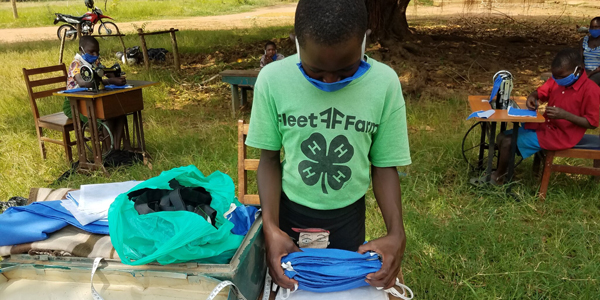
Pivoting in a Pandemic
ISU-UGANDA PROGRAM FINDS NEW WAYS TO SERVE
Some people must walk miles to reach clean water in Uganda. This is more of a hardship than ever, when regularly washing one’s hands or face covering can prevent infection from COVID-19.
Life-saving water is now more available in the country’s Kamuli and Buyende districts, thanks to Iowa State University’s Uganda Program, part of the Center for Sustainable Rural Livelihoods in the College of Agriculture and Life Sciences. With leadership from the program, three new boreholes (deep wells) now supply needed water to about 1,660 households, a hospital, schools and a nutrition education center.
To assure the wells are properly managed, Thomas Buyinza, postharvest technology and WASH specialist with the ISU-Uganda Program, coordinates with local user committees. He works with them to operate and maintain the boreholes, conduct sanitation trainings and help set up outdoor dispensers known as “tippy taps.” Expanding the availability of safe water is just one of the emergency initiatives the program has launched in response to the pandemic, reports Dr. Gideon Nadiope, national director for the ISU-Uganda Program. His staff’s new efforts also include organizing special deliveries of grain and fortified flour to help feed vulnerable households, providing educational materials to youth during extended school closures and creating affordable face masks.
DELIVERING FOOD AND EDUCATION
Since the pandemic hit, the ISU-Uganda Program has been ensuring hunger doesn’t get a stronger foothold in their district. As key sectors of the country’s economy were locked down to control infection rates, Nadiope and his team worked closely with the Kamuli COVID-19 Task Force to deliver corn flour, rice, soap and seeds to rural areas and health workers in areas with tight food supplies.
While using safe practices, ISU-Uganda Program staff also have been bringing fortified flour door-to-door to vulnerable households, sometimes “over roads and footpaths that are not very accessible, especially during the rainy season,” says Carolyn Nambafu, ISU-UP Nutrition Coordinator. In addition, they are making and distributing a nutrient-dense porridge to low-income breastfeeding mothers and working with schools and village chairpersons to take meals to home-bound students.
Along with food, team members organized a system for delivery of educational supplies to keep youth engaged during extended school closures. ISU-Uganda Program Educational Coordinator Esther Asimo works with the country’s Ministry of Education and teachers to distribute lessons and reading materials. They enlisted community leaders to help check on the students and get their lessons to teachers, who correct and send them back, closing the learning loop to let pupils know their education matters.
OPPORTUNITIES WITHIN A BAD SITUATION
During time away from classes, some students are being trained as tailors. A set of treadle sewing machines were being used to make washable, sanitary pads for older girls, to help keep them in school. Now they also are stitching up face masks.
“Masks have been required in public spaces throughout the country for all citizens over six years old,” says Dr. Nadiope. “They are in high demand, and many Ugandans have a hard time affording them.”
The idea to use the machines to make masks originated with the donor who first gifted the machines — Karen Kolschowsky (’08 honorary). The Uganda team conferred with the Ministry of Health and designed a pattern for a reusable, cloth face covering that would meet health guidelines. They purchased supplies with funds that would have been used for a summer internship program, canceled for 2020, and support from donors including the Kolschowsky family.
Six machines were shifted to mask-making at locations that accommodate social distancing, according to Miriam Namata, ISU-Uganda Program Community Innovations Officer. The project’s seamstresses have so far made more than 800 masks for low-income households. Some are being sold at a subsidized price, with proceeds to help support families’ school fees and a Youth Entrepreneurship Program.
“This effort has been very successful,” says Namata. “We are considering the possibility of purchasing more sewing machines and have ideas for using them in the future to make more affordable school uniforms.”
These are just a few of the ways the staff of the ISU-Uganda Program continue to serve their communities and find opportunities within a bad situation, Director Nadiope says.
“Even after the pandemic, we believe the groups we are working with will have new knowledge and skills,” he says. “This will bring opportunities to better sustain themselves and allow them to serve as great role models in their communities.”
CSRL Director David Acker, Associate Dean for Global Engagement, says he has never been more proud of the ISU-Uganda Program staff.
“The aim of CSRL has always been rural development,” he says. “However, current circumstances are requiring us to think and act creatively and pivot toward providing more relief services. We deeply appreciate our donors’ commitment to support the work of our wonderful team on the ground in Uganda.”



